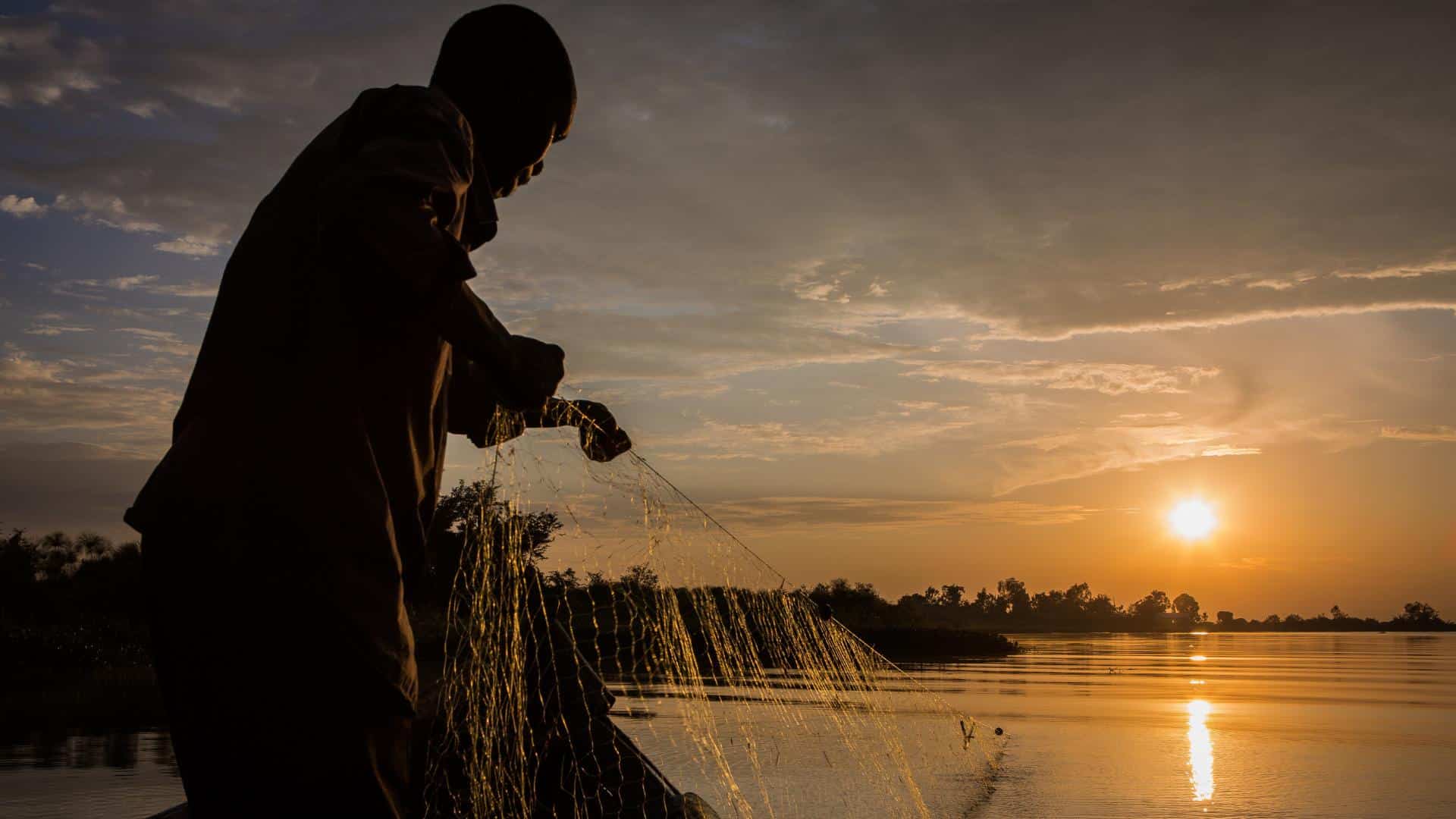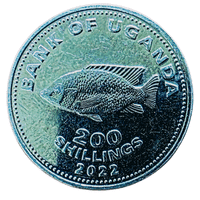Fish are disappearing in an African lake that feeds the people of four countries. Freshwater lakes may not be as vast as oceans but they are just as important.

A fisherman casts a net from his boat on Lake Tanganyika in Central Africa. (Credit: Martin Harvey/WWF)
This article was produced exclusively for News Decoder’s global news service. It is through articles like this that News Decoder strives to provide context to complex global events and issues and teach global awareness through the lens of journalism. Learn how you can incorporate our resources and services into your classroom or educational program.
In the rust-coloured morning haze that hangs low over Lake Tanganyika, fishermen cast their nets with a rhythm honed by generations.
The lake, hemmed by four countries and rich with biodiversity, once teemed with life, including sardines, perch, tilapia and the fearsome tigerfish.
But today, their catch is scant. Where there was once abundance, there is absence, and where there was once silence, there is now an urgent plea for action.
Across Africa’s great lakes and winding rivers, nearly one in four freshwater fish species is threatened with extinction and that may be a gross underestimate because it is based on assessments. Entire fisheries have dwindled to shadows of their former abundance.
This moment comes as the Ramsar COP15 wetlands conference in Zimbabwe approaches — a major international summit where leaders will gather, for a moment, to debate water, development and biodiversity. WWF and its partners are urging countries to commit to the 30×30 inland waters target under the Global Biodiversity Framework — protecting 30% of rivers, lakes and wetlands by 2030.
The depletion of fish
In the Zambezi floodplain, local catches have dropped by 90% of what they once were. In Lake Malawi, the Karonga tilapia — known locally as chambo — is so culturally significant it appears on the national currency. But in the lake it has declined by 94%.

Ugandan currency
This month, the World Wide Fund for Nature (WWF) released Africa’s Forgotten Fishes, a sweeping report that documents the alarming decline of freshwater fish populations across the continent.
The losses are more than “a biodiversity crisis,” said Machaya Chomba, Africa freshwater protection manager at The Nature Conservancy, which co-produced the report. “It is a direct threat to livelihoods and cultural identity for millions.”
These fisheries, largely small-scale and community-managed, are lifelines for tens of millions of people across the continent. They feed families, support markets and form the backbone of local economies.
In Lagos, women dry and smoke catfish for sale. Along the shores of Lake Victoria, boat crews load their nightly haul into wooden canoes. In the floodplains of Zambia, entire communities revolve around the seasonal spawning patterns.
Pressure on aquasystems
The report outlines a web of pressures pushing these aquatic systems to the brink: habitat destruction from dam construction and deforestation; pollution from agriculture and urban runoff; invasive species and unsustainable fishing practices, including the widespread use of mosquito nets; and the unpredictable currents of a changing climate.
Africa is home to more than 3,200 recorded freshwater fish species — a number that grows annually as new species are described, including 28 in 2024 alone. Yet many of these species live in isolation, bound to single lakes or rivers. The continent’s geography, fractured by plateaus, mountains and deserts, has produced distinct and stunning radiations of life.
Consider the cichlids of Africa’s Great Lakes: Lake Malawi alone harbours over 800 species, most found nowhere else. Some parent their young by brooding them in their mouths; others, like Nimbochromis livingstonii, feign death to lure prey. In the Congo’s lightless rapids, Lamprologus lethops has evolved with skin-covered eyes.
Lungfish, relics of the Devonian era, survive years of drought by burrowing into mud and breathing air through primitive lungs. The ornate bichir, another ancient lineage, gulps air through a lung-like swim bladder and can endure short stints out of water if kept moist.
Cichlids and cuckoo catfish
In Lake Tanganyika, the cuckoo catfish surreptitiously deposits its eggs among those of mouthbrooding cichlids, leaving its young to be raised — at the expense of their foster siblings — by another species.
These are not curiosities, but rather sentinels. Freshwater fish are the regulators of aquatic ecosystems — grazers, predators, cleaners and recyclers of aquatic systems.
They “are an aquatic version of the canary in the coal mine for Africa’s rivers, lakes and wetlands,” the report warns. “If the continent’s freshwater ecosystems deteriorate to the point where they can’t support thriving fish populations, they won’t be healthy enough to continue to underpin Africa’s societies and economies.”
The cost is already being felt. On the Kafue Flats in Zambia, once a thriving fishing ground that supplied 15-22% of the nation’s catch, dam construction has altered seasonal flood pulses. Permanent inundation has decoupled the river from its floodplain. Five key fish species have become commercially extinct.
In Salonga National Park in the Democratic Republic of Congo, local fishers have resorted to toxic fishing methods, poisoning the very waters they depend on. Along the Rufiji River in Tanzania, traditional species like the Rufiji tilapia are declining under pressure from monofilament nets and habitat loss.
Despite the devastation, the report also offers hope. Community-led conservation is showing results. In Tanzania’s Lake Tanganyika region, 21 Beach Management Units — local organizations of fishers, elders, and women — are enforcing seasonal fishing bans and banning destructive gear. In Zambia’s Liuwa Plain and conservancies in Namibia, fishers are co-managing resources with support from WWF and The Nature Conservancy.
Conserving freshwater ecosystems
In Angola, community leaders are building bottom-up monitoring systems to track and protect fish stocks. In Madagascar, captive breeding programs are trying to save rainbowfish and cichlids teetering on the edge of extinction.
Still, freshwater ecosystems remain the “forgotten sibling” of terrestrial and marine conservation. Their decline has unfolded quietly, out of sight of many global decision-makers. “It’s time we stopped treating freshwater fishes as an afterthought,” said Nancy Rapando, WWF’s Africa Food Futures Lead. “They are central to Africa’s biodiversity, development and future. We must act now before the rivers dry out.”
The report outlines a science-based Emergency Recovery Plan — a six-pillar framework that includes restoring natural river flows, improving water quality, protecting habitats, ending unsustainable use, controlling invasive species and removing obsolete dams to let rivers run free.
“These six pillars have all been successfully implemented successfully around the world,” said Eric Oyare, WWF Africa’s freshwater lead. “With bold leadership, African countries can adapt them to local contexts.”
The Freshwater Challenge, a growing coalition aiming to restore 300,000 kilometres of degraded rivers and 350 million hectares of wetlands now includes 20 African countries.
But headlined declarations are not enough. What’s required is a shift in how governments, funders and societies value the submerged world. For decades, development decisions — from damming rivers to draining wetlands — have ignored the true cost of fish loss. Policies rarely account for the food, labour and cultural systems tied to inland fisheries.
“Africa’s freshwater fishes are not forgotten by the people who depend on them, whose lives and livelihoods are interwoven with the continent’s rivers, lakes and wetlands and the fish beneath their surface,” the report said. “But they have invariably been out of sight and out of mind for policymakers, especially when it comes to big decisions that impact freshwater ecosystems.”
Questions to consider:
1. What is the goal of the COP15 meeting in Brazil this year?
2. Why do freshwater lakes deserve the same protections as oceans?
3. What freshwater lake is nearest to you and what lives in it?

Enock Wanderema is News Decoder's correspondent in Uganda. He has written articles about identity, the environment, wildlife conservation and politics. He loves writing and bringing complex stories to life in the simplest ways.
